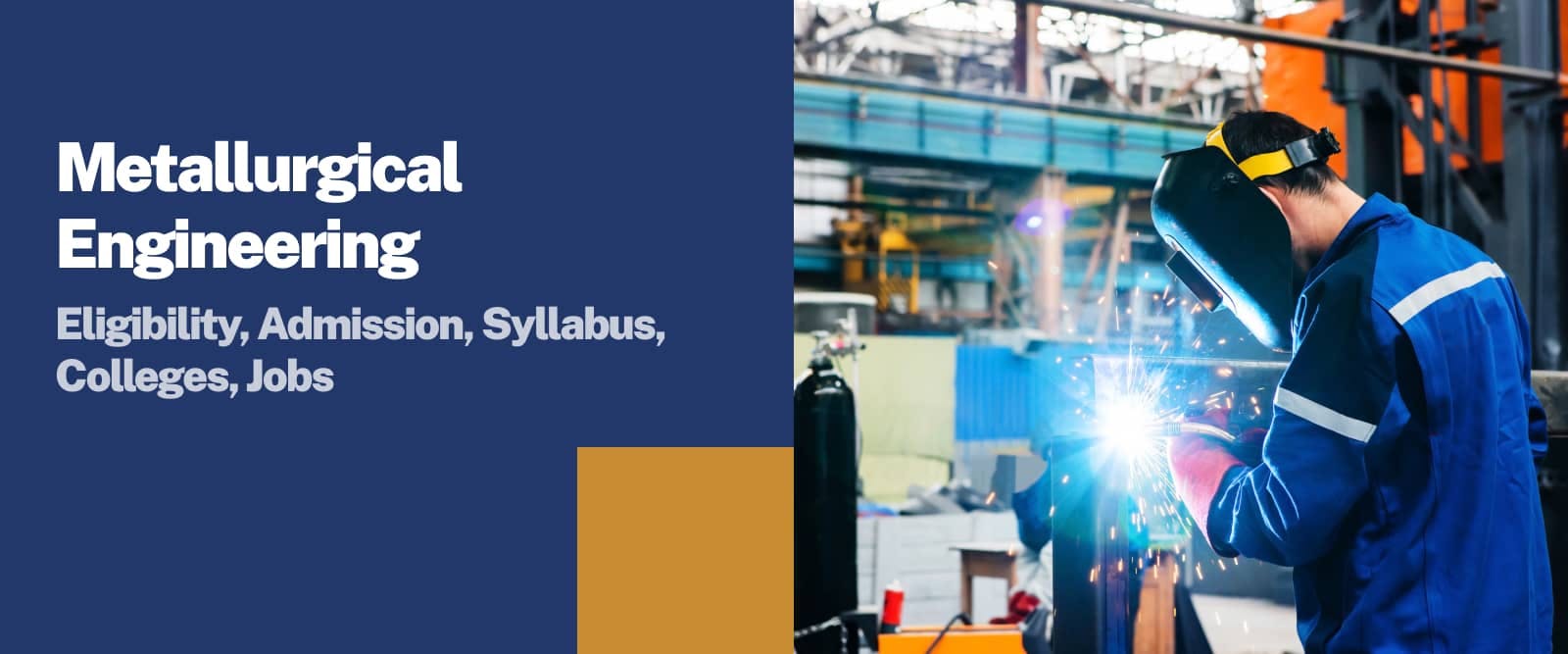5800 students unlocked their dream jobs with UG/PG programs in top colleges. Apply Now!
By definition, Metallurgical engineering is a branch of engineering that deals with the study of metals, their extraction from ores, and the development of metallic materials for various purposes. It involves the study of physical and chemical processes used to transform raw metals into useful products.
In India, the demand for metallurgical engineers is high, as the land here has abundant natural resources and a large metal industry. After completing a B.Tech course in Metallurgical Engineering, students can expect to find employment in the automotive, aerospace, and electronics industries and research organisations.
Besides, the demand for metallurgical engineers is expected to remain high in the coming years due to the increasing use of metals in various industries. Keep reading to get to the list of top engineering colleges in India offering B.Tech courses in Metallurgical Engineering.
Eligibility to Pursue Metallurgical Engineering in India
To pursue a B.Tech course in Metallurgical Engineering, students typically need to meet the following eligibility criteria:
- Educational Qualification: To be eligible to study Metallurgical Engineering, you need to have completed your 10+2 or equivalent with physics, chemistry, and mathematics as core subjects. Some universities also require a minimum percentage in these subjects.
- Entrance Examinations: Many universities conduct entrance exams for admission to Metallurgical Engineering programs. The most common entrance exams include JEE Main, BITSAT, and VITEEE.
- Age Limit: There is usually no age limit to pursue a degree in Metallurgical Engineering, but some universities may have an age limit for admission to their programs
Admission Process for Metallurgical Engineering Degree Courses
- Meet Eligibility Criteria: Ensure that you meet the eligibility criteria for admission to the program, including educational qualification, age limit, and entrance examination requirements.
- Take Entrance Examinations: Take the required entrance examinations, such as JEE Main, BITSAT, or VITEEE.
- Submit Application and Supporting Documents: Submit an application to the university or institution of your choice, along with supporting documents such as transcripts, test scores, and other required materials.
- Attend Interviews or Group Discussions: Some universities may conduct interviews or group discussions as part of the admission process. Be prepared to answer questions about your interests, motivation, and qualifications for the program.
- Wait for Offer Letter: Wait for the offer letter from the university or institution. This will typically include details about the program, fees, and other important information.
- Accept Offer and Pay Fees: If you are satisfied with the offer, accept it and pay the required fees to secure your admission.
Syllabus for Metallurgical Engineering
A typical course curriculum for a Metallurgical Engineering program includes the following B.Tech subjects split across 8 semesters (4 years):
Semester 1
- Physics – I: Classical, Quantum & Relativistic Mechanics
- Chemistry – I
- Engineering Mathematics – I
- Engineering Thermodynamics
- Manufacturing Practices– I
- Engineering Drawing
- Universal Human Values – I: Self and Family
Semester 2
- Engineering Mathematics – II
- Computer Programming
- Introduction to Metallurgy and Materials Engineering
- Metallurgical Thermodynamics and Kinetics
- Manufacturing Practices – II
- Metallurgical Practices – I
- Development of Societies
- History and Civilization
- Philosophy
- Education and Self
Semester 3
- Numerical Techniques
- Fundamentals of Electronics and Instrumentation Engineering
- Structure of Materials
- Principles of Extractive Metallurgy
- Extractive Metallurgy Practical
- Development of Societies
- History and Civilization - II
Semester 4
- Mathematical Methods
- Transport Phenomena
- Phase Diagrams
- Transport Phenomena Practical
- Iron Making Technologies
- Metallography Techniques
- Metallography Techniques Practical
Semester 5
- Modelling and Simulation in Metallurgy
- Deformation and Testing of Materials
- Phase Transformations
- Material Processing Technologies
- Metallurgical Practices II: Materials Processing
Semester 6
- Heat Treatment
- Steel Making Technologies
- Mechanical Behaviour of Materials
Semester 7
- Non-Ferrous Extractive Metallurgy
Semester 8
- Corrosion and Prevention
Colleges That Offer Metallurgical Engineering Courses
One can pursue a course in metallurgical engineering by opting for a B.Tech course in any of the top engineering colleges in India.
COEP Pune
College of Engineering, Pune, established in 1854, is a globally known pioneer in the field of technical education, including metallurgical engineering.
|
Eligibility |
Candidates must pass class 12th with at least 45% marks in aggregate with Physics & Mathematics as compulsory subjects. |
|
Course Fee |
₹218,950 |
|
Average Salary |
₹8.1 lakhs per year |
Noida International University (NIU), Noida
Established in 2010, NIU is a popular college for B.Tech Metallurgical Engineering. The course comes with Sunstone’s advantage, where the student can experience industry-aligned training modules and impeccable placement support.
|
Eligibility |
Candidates must pass class 12th with at least 50% marks in aggregate with Physics & Mathematics as compulsory subjects. |
|
Course Fee |
₹4,44,000 |
|
Average Salary |
₹2.9 to 3.8 lakh per year |
PSG Tech, Coimbatore
Established in 1951, PSG Tech offers one of the best metallurgical engineering degree courses in the country with exceptional learning methods and campus placements.
|
Eligibility |
|
|
Course Fee |
₹2,40,000 |
|
Average Salary |
₹5 lakhs per year |
Suresh Gyan Vihar University (SGVU), Jaipur
Established in 2008, SGVU offers a B.Tech course in metallurgy. The 4-year course comes with Sunstone’s benefits that give students an edge when stepping out into the corporate world. Sunstone also offers internships for engineering students that help them learn directly from the industry.
|
Eligibility |
Candidates must pass class 12th with at least 60% marks in aggregate with Physics and Mathematics as compulsory subjects. |
|
Course Fee |
₹5,43,000 |
|
Average Salary |
₹3.5 lakhs per year |
Note: Fees, course structure, and eligibility criteria can be modified by the college authority without any prior notification. Therefore, we recommend that enquire about the metallurgical engineering course details before applying to your preferred college.
Jobs After Completion of the Metallurgical Engineering Course
Graduates of Metallurgical Engineering can pursue a variety of careers depending on their interests and skills. Some of the top job profiles for individuals with a background in Metallurgical Engineering include
- Metallurgical Engineer: These engineers use their knowledge of metals and alloys to improve processes, develop new products and technologies, and solve problems in the production of metals and alloys. The average pay for this role is ₹4,00,000 - ₹7,00,000 per year
- Process Engineer: Process Engineers design, develop, and optimise the production processes for various industries, including metals, minerals, and ceramics. The average pay for this role is ₹4,50,000 - ₹7,50,000 per year
- Materials Scientist: Materials Scientists conduct research on the properties and behaviour of various materials, including metals, with the aim of developing new materials or improving existing ones. The average pay for this role is ₹4,50,000 - ₹8,00,000 per year
- Research and Development Engineer: R&D Engineers use their knowledge of materials science and engineering to design and develop new products, processes, and technologies. The average pay for this role is ₹5,00,000 - ₹8,00,000 per year
- Quality Control Engineer: Quality Control Engineers ensure that products meet specified standards and regulations through the application of quality control techniques. The average pay for this role is ₹4,00,000 - ₹6,50,000 per year
- Production Manager: Production Managers are responsible for the day-to-day operations of production facilities, including scheduling, budgeting, and overseeing production processes. The average pay for this role is ₹6,00,000 - ₹10,00,000 per year
- Technical Service Engineer: Technical Service Engineers provide technical support to customers and help resolve problems related to the production of metals and alloys. The average pay for this role is ₹4,50,000 - ₹7,00,000 per year
- Mining Engineer: Mining Engineers design and manage mining operations, ensuring that they are safe, efficient, and environmentally sustainable. The average pay for this role is ₹5,00,000 - ₹8,00,000 per year
Conclusion
The Metallurgical Engineering course has a bright scope in India as well as countries abroad. Choosing a B.Tech course in metallurgical engineering with Sunstone’s advantages can unlock many avenues for aspiring students and help them build a lucrative career in the field of metallurgy with job-ready training.
HELP
Take the first step towards your dream job.
ABOUT THE AUTHOR


